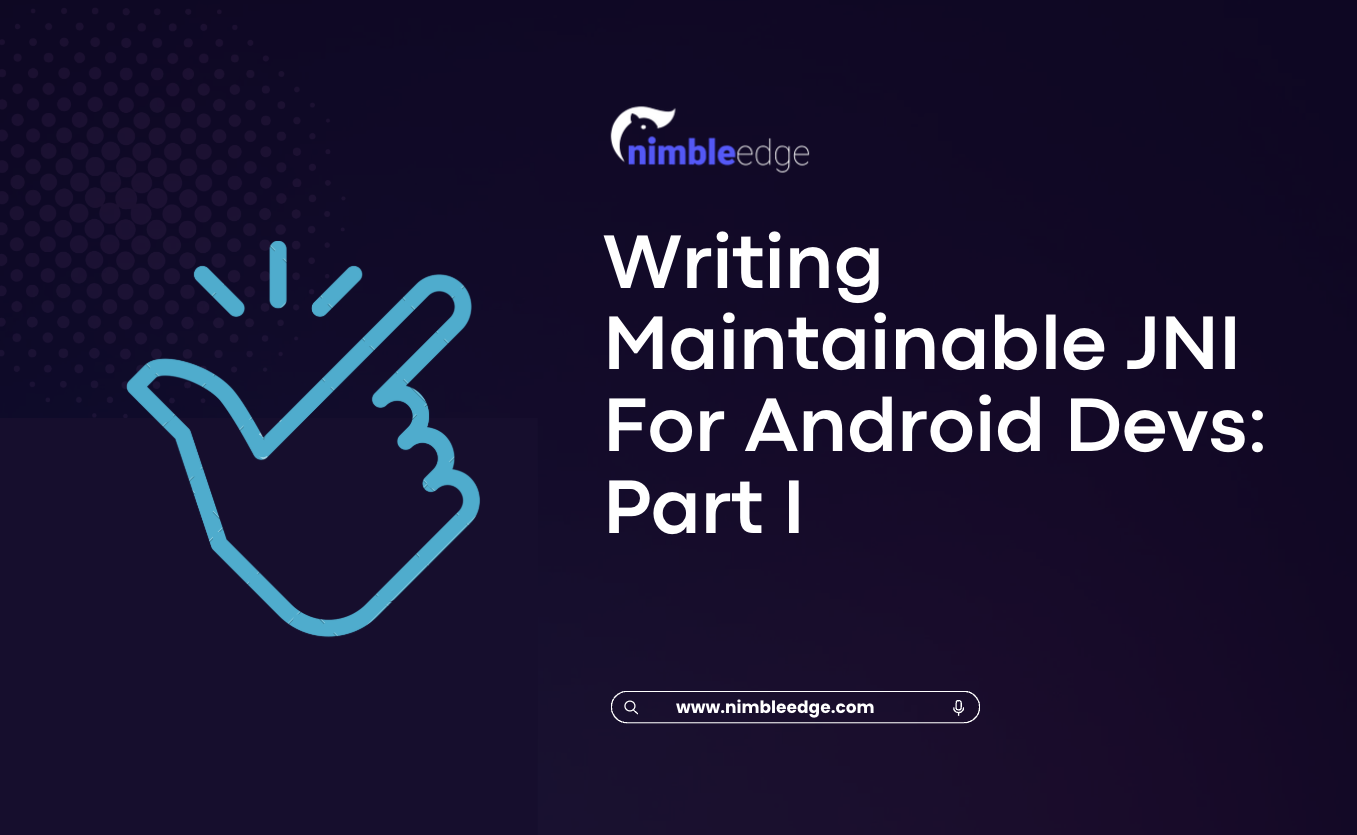Writing Maintainable JNI For Android Devs: Part I

Ever felt like JNI (Java Native Interface) was more of a puzzle box than a useful tool?
Fear not—today we’re diving deep into JNI without the headaches! 🚀
Why Should You Care About JNI?
If you’ve ever wanted to:
- Call C++ functions from Kotlin or Java,
- Boost performance for heavy-lifting algorithms (image processing, encryption, etc.),
- Handle advanced hardware interactions (e.g., sensors or native libraries),
...then JNI is your secret sauce! But it can also turn your code into a spaghetti monster 🍝 if you’re not careful.
How Do Big Companies Use JNI?
1️⃣ Spotify – Audio Processing & Heavy Computations
Spotify leverages the Java Native Interface (JNI) to integrate performance-critical audio processing components written in C++
- Spotify's Voyager library employs Java Native Interface (JNI) bindings to integrate C++ functionalities into Java applications, facilitating efficient approximate nearest-neighbor searches.
2️⃣ Whatsapp – Real-Time Media Processing
WhatsApp applies image filters and carries our encryption via JNI:
- Uses native C++ libraries for media filters, and video compression.
- Their photo upload pipeline compresses images with native code for faster uploads.
3️⃣ Google Chrome – Web Rendering Engine
Chrome for Android uses JNI to integrate Blink (the C++ rendering engine).
- The browser’s core runs 100% in C++, with Java only handling UI and user interaction.
- Without JNI, Chrome’s performance on Android would be terrible.
4️⃣ Twilio Conversations – Unified Business Logic For Android & iOS
- Twilio Conversations leverages JNI to bridge shared C++ logic across platforms, eliminating the need for separate implementations.
- While working on the Twilio Conversations Android SDK, I implemented state machines within the JNI layer to manage consistent states between Android and iOS, ensuring reliable and efficient cross-platform messaging.
Why is JNI critical for us at NimbleEdge?
At NimbleEdge we provide an on-device AI platform capable of running ML models and AI workflows directly on devices unlocking AI native experiences for millions of users across the globe. As these devices are quite resource constrained (compared to their cloud counterparts) our focus is always on optimal performance with efficiency ensuring apps can be natively built with recommendations, reasoning or voice modalities running on device.
In order to achieve this our core platform is written in highly optimized C++ interfacing with the Android layer with the JNI interface - so you can imagine leveraging JNI is critical to our platform for performance and efficiency. In particular with JNI we focus on the following aspects:
- Efficient Data Handling: JNI enables seamless processing of:
- Large tensors (e.g., 320 × 320 × 600)
- Super complex JSON structures
- Protobuf objects
- Low Latency & High Speed: This architecture ensures minimal latency and high-speed computation for real-time AI applications.
Common JNI Nightmares (and How They Haunt Us)
1. Local Reference Overflows
Every Java object you touch in native code generates a “local reference.”
Too many references in one function = Crash City 💥.
2. Memory Leaks Galore
JNI is essentially C++. You malloc, you must free.
One missed free? Memory creeps up like a ghost 👻.
3. Verbose, Repetitive Code
Finding classes, method IDs, exception checks, type conversions… 😫
One small call can explode into 10+ lines of boilerplate.
4. C-Style Function Names
Java_com_example_whatever_functionName—ugh.
It’s a leftover from the ‘90s: hard to read, even harder to love!
Sound familiar? Buckle up—let’s fix them! 🤝
Four Quick Fixes to Make JNI Fun Again
1. Embrace RAII & Smart Pointers
RAII stands for “Resource Acquisition Is Initialization.” Translation:
“Create resources in constructors, free them in destructors so you never forget.”
Example: Memory Management:
// This can leak if 'free(data)' is never called
char* data = (char*)malloc(256);
// Freed automatically when out of scope. Zero leaks!
#include <memory>
auto buffer = std::make_unique<char[]>(256);
Result? Your memory management nightmares vanish. Poof! ✨
2. Tiny String Helpers
Converting jstring ↔ char* in JNI is a chore. You must call GetStringUTFChars() and then ReleaseStringUTFChars()—or suffer leaks. A small RAII class solves that:
JNIString(JNIEnv* env, jstring javaStr)
: env_(env), javaStr_(javaStr), cStr_(nullptr)
{
if (!env_ || !javaStr_) {
throw std::runtime_error("JNIString constructor: env or javaStr is null");
}
cStr_ = env_->GetStringUTFChars(javaStr_, nullptr);
}
~JNIString() {
if (env_ && javaStr_ && cStr_) {
env_->ReleaseStringUTFChars(javaStr_, cStr_);
}
}
const char* c_str() const {
return cStr_;
}
Now you can do:
JStringHelper myString(env, jString);
LOGD("Received: %s", myString.c_str());
No leaks—ever. 🥳
3. Dynamic Registration (Buh-Bye, Ugly Names!)
You don’t have to write monstrous names like Java_com_example_MyActivity_doStuff. Use dynamic registration:
// Step 1: In Kotlin
class MyActivity {
external fun doStuff()
}
// Step 2: In C++
static JNINativeMethod methods[] = {
{"doStuff", "()V", (void*) nativeDoStuff}
};
env->RegisterNatives(clazz, methods, 1);Your C++ function is simply nativeDoStuff(). A million times cleaner 🧼.
4. Shadow Classes to Wrap Java/Kotlin Objects
This is the game-changer if your JNI calls are more than one or two lines. A “shadow class” encapsulates all the JNI lookups for a specific Java/Kotlin object. For example, a Restaurant:
class RestaurantShadow {
static jclass clazz;
jobject restaurantObj;
public:
static void init(JNIEnv* env) {
// find class, store method IDs once
}
RestaurantShadow(JNIEnv* env, jobject obj) {
// keep GlobalRef
}
std::string getName(JNIEnv* env) {
// call getName() on the Restaurant object
}
};Next time you want the name:
RestaurantShadow restaurant(env, jRestaurantObj);
std::string name = restaurant.getName(env);No repeating FindClass or GetMethodID. So much nicer. 🎉
Real-Life Example: My “RestaurantSerialization” Project
Wondering if this actually works in a real Android project? Let me show you exactly how these four strategies power my RestaurantSerialization App.
1️⃣ Tidy Code via Shadow Classes
- Dedicated Shadows for each data model:
/**
* data class Restaurant(
* val id: String,
* val name: String,
* val address: Address,
* val rating: Double,
* val cuisines: List<String>,
* val phoneNumber: String?,
* val website: String?,
* val openingHours: List<OpeningHour>,
* val menu: List<MenuItem>
* )
*/
class RestaurantShadow {
private:
inline static jclass restaurantClass;
inline static jmethodID getIdMethodId;
inline static jmethodID getNameMethodId;
inline static jmethodID getAddressMethodId;
inline static jmethodID getRatingMethodId;
inline static jmethodID getCuisinesMethodId;
inline static jmethodID getPhoneNumberMethodId;
inline static jmethodID getWebsiteMethodId;
inline static jmethodID getOpeningHoursMethodId;
inline static jmethodID getMenuMethodId;
jobject restaurantObject;
public:
static bool init(JNIEnv* env) {
if (!env) return false;
jclass localClass = env->FindClass("com/voidmemories/restaurant_serializer/Restaurant");
if (!localClass) {
return false;
}
restaurantClass = static_cast<jclass>(env->NewGlobalRef(localClass));
env->DeleteLocalRef(localClass);
if (!restaurantClass) {
return false;
}
// Get method IDs for all getters
getIdMethodId = env->GetMethodID(restaurantClass, "getId", "()Ljava/lang/String;");
getNameMethodId = env->GetMethodID(restaurantClass, "getName", "()Ljava/lang/String;");
getAddressMethodId = env->GetMethodID(restaurantClass, "getAddress", "()Lcom/voidmemories/restaurant_serializer/Address;");
getRatingMethodId = env->GetMethodID(restaurantClass, "getRating", "()D");
getCuisinesMethodId = env->GetMethodID(restaurantClass, "getCuisines", "()Ljava/util/List;");
getPhoneNumberMethodId = env->GetMethodID(restaurantClass, "getPhoneNumber", "()Ljava/lang/String;");
getWebsiteMethodId = env->GetMethodID(restaurantClass, "getWebsite", "()Ljava/lang/String;");
getOpeningHoursMethodId = env->GetMethodID(restaurantClass, "getOpeningHours", "()Ljava/util/List;");
getMenuMethodId = env->GetMethodID(restaurantClass, "getMenu", "()Ljava/util/List;");
if (!getIdMethodId || !getNameMethodId || !getAddressMethodId ||
!getRatingMethodId || !getCuisinesMethodId || !getPhoneNumberMethodId ||
!getWebsiteMethodId || !getOpeningHoursMethodId || !getMenuMethodId) {
return false;
}
return true;
}
RestaurantShadow(JNIEnv* env, jobject obj) {
if (!env || !obj) {
throw std::runtime_error("Invalid constructor arguments for RestaurantShadow.");
}
restaurantObject = env->NewGlobalRef(obj);
}
~RestaurantShadow() {
JNIEnv* env;
int getEnvStatus = globalJvm->GetEnv(reinterpret_cast<void**>(&env), JNI_VERSION_1_6);
if (restaurantObject && getEnvStatus != JNI_EDETACHED && env != nullptr) {
env->DeleteGlobalRef(restaurantObject);
}
}
std::string getId(JNIEnv* env) {
if (!env || !restaurantObject || !getIdMethodId) {
throw std::runtime_error("Invalid state to call getId.");
}
jstring jId = (jstring)env->CallObjectMethod(restaurantObject, getIdMethodId);
if (!jId) {
return std::string();
}
JNIString idStr(env, jId);
return std::string(idStr.c_str());
}
std::string getName(JNIEnv* env) {
if (!env || !restaurantObject || !getNameMethodId) {
throw std::runtime_error("Invalid state to call getName.");
}
jstring jName = (jstring)env->CallObjectMethod(restaurantObject, getNameMethodId);
if (!jName) {
return std::string();
}
JNIString nameStr(env, jName);
return std::string(nameStr.c_str());
}
// Returns a jobject for the Address. The caller can then wrap it in AddressShadow if desired.
jobject getAddress(JNIEnv* env) {
if (!env || !restaurantObject || !getAddressMethodId) {
throw std::runtime_error("Invalid state to call getAddress.");
}
return env->CallObjectMethod(restaurantObject, getAddressMethodId);
}
double getRating(JNIEnv* env) {
if (!env || !restaurantObject || !getRatingMethodId) {
throw std::runtime_error("Invalid state to call getRating.");
}
return env->CallDoubleMethod(restaurantObject, getRatingMethodId);
}
// Returns a jobject reference to a Java List<String> of cuisines
jobject getCuisines(JNIEnv* env) {
if (!env || !restaurantObject || !getCuisinesMethodId) {
throw std::runtime_error("Invalid state to call getCuisines.");
}
return env->CallObjectMethod(restaurantObject, getCuisinesMethodId);
}
std::string getPhoneNumber(JNIEnv* env) {
if (!env || !restaurantObject || !getPhoneNumberMethodId) {
throw std::runtime_error("Invalid state to call getPhoneNumber.");
}
jstring jPhone = (jstring)env->CallObjectMethod(restaurantObject, getPhoneNumberMethodId);
if (!jPhone) {
return std::string();
}
JNIString phoneStr(env, jPhone);
return std::string(phoneStr.c_str());
}
std::string getWebsite(JNIEnv* env) {
if (!env || !restaurantObject || !getWebsiteMethodId) {
throw std::runtime_error("Invalid state to call getWebsite.");
}
jstring jWebsite = (jstring)env->CallObjectMethod(restaurantObject, getWebsiteMethodId);
if (!jWebsite) {
return std::string();
}
JNIString websiteStr(env, jWebsite);
return std::string(websiteStr.c_str());
}
// Returns a jobject reference to Java List<OpeningHour>
jobject getOpeningHours(JNIEnv* env) {
if (!env || !restaurantObject || !getOpeningHoursMethodId) {
throw std::runtime_error("Invalid state to call getOpeningHours.");
}
return env->CallObjectMethod(restaurantObject, getOpeningHoursMethodId);
}
// Returns a jobject reference to Java List<MenuItem>
jobject getMenu(JNIEnv* env) {
if (!env || !restaurantObject || !getMenuMethodId) {
throw std::runtime_error("Invalid state to call getMenu.");
}
return env->CallObjectMethod(restaurantObject, getMenuMethodId);
}
};
- RestaurantShadow.h is in charge of calling Java methods like
getName(), getAddress(), getOpeningHours(). - Why it’s better: Instead of cramming dozens of
env->FindClassandenv->GetMethodIDcalls into a single file, I group them by data model. That means if I update theAddressstructure, I only touchAddressShadow.
- Initialization Done Once: Each shadow class has an
init()method that fetches class references and method IDs only once at startup. After that, the getters are just direct calls—no repeated lookups. - //TODO: in the medium article add code snippet from GH
2️⃣ Safe RAII Wrappers (No Memory or Reference Leaks)
/**
* @class JNIString
* @brief A helper class that manages the lifetime of a jstring->C string mapping.
*
* Usage:
* JNIString jniString(env, someJString);
* const char* cStr = jniString.c_str();
* // cStr remains valid until jniString goes out of scope
*/
class JNIString {
public:
/**
* Constructs a JNIString from a jstring, acquiring its UTF-8 chars.
* @param env Pointer to the JNI environment.
* @param javaStr jstring to convert to a C-style string.
* @throws std::runtime_error if env or javaStr is null.
*/
JNIString(JNIEnv* env, jstring javaStr)
: env_(env), javaStr_(javaStr), cStr_(nullptr)
{
if (!env_ || !javaStr_) {
throw std::runtime_error("JNIString constructor: env or javaStr is null");
}
cStr_ = env_->GetStringUTFChars(javaStr_, nullptr);
}
/**
* Releases the UTF-8 chars back to the JVM if they were acquired.
*/
~JNIString() {
if (env_ && javaStr_ && cStr_) {
env_->ReleaseStringUTFChars(javaStr_, cStr_);
}
}
/**
* @return A const char* representing the UTF-8 string data.
*/
const char* c_str() const {
return cStr_;
}
private:
JNIEnv* env_;
jstring javaStr_;
const char* cStr_;
};
- Global Refs & Destructors:
- When I construct, say, a
RestaurantShadow, I store a global JNI reference to the passedjobject. - In the destructor, I release that reference. This ensures no lingering references and no risk of using a freed Java object.
- When I construct, say, a
- String Helper for Freed Memory:
- Whenever I convert a Java string to C++ (e.g., the restaurant’s name), a small RAII helper class automatically calls
ReleaseStringUTFChars(). - Result: I can’t “forget” to free anything. Memory leaks become far less likely.
- Whenever I convert a Java string to C++ (e.g., the restaurant’s name), a small RAII helper class automatically calls
3️⃣ Readable, Minimal Boilerplate
One-Liner Getters:
std::string name = restaurantShadow.getName(env);- No rummaging around for
env->FindClass("...Restaurant"), thenenv->GetMethodID("getName"), thenenv->CallObjectMethod(). It’s all under the hood. - Clear Separation: The shadow classes live in a dedicated folder:
jni/shadowClasses/
This keeps your JNI bridging code from mixing with your business logic.
4️⃣ Minimal JNI Bridge: 4 Lines of Code
- In jni.cpp, you’ll see the native registration is super short:
// Init functions, called only once!!!
static const JNINativeMethod nativeMethods[] = {
{"serializeRestaurant", "(Lcom/voidmemories/restaurant_serializer/Restaurant;)Ljava/lang/String;",
(void *)serializeRestaurant}
};
JNIEXPORT jint JNICALL JNI_OnLoad(JavaVM *vm, void * /*reserved*/) {
globalJvm = vm;
JNIEnv *env = nullptr;
if (vm->GetEnv(reinterpret_cast<void **>(&env), JNI_VERSION_1_6) != JNI_OK || !env) {
return -1;
}
AddressShadow::init(env);
MenuItemShadow::init(env);
OpeningHourShadow::init(env);
RestaurantShadow::init(env);
jclass clazz = env->FindClass("com/voidmemories/restaurant_serializer/ExternalFunctions");
if (!clazz) {
return -1;
}
if (env->RegisterNatives(clazz, nativeMethods, sizeof(nativeMethods) / sizeof(nativeMethods[0])) != JNI_OK) {
return -1;
}
return JNI_VERSION_1_6;
}- Init all shadows (like
RestaurantShadow::init(env);). - Register the external Kotlin functions with a simple array of
JNINativeMethod. - Done.
Because the shadows and core logic (see below) do the heavy lifting, your JNI bridge remains extremely clean and mostly just for hooking up method references.
5️⃣ Kotlin Data Models & Driver Function
Simple Data Classes in DataModels.kt:
data class Restaurant(
val id: String,
val name: String,
val address: Address,
val rating: Double,
val cuisines: List<String>,
val phoneNumber: String?,
val website: String?,
val openingHours: List<OpeningHour>,
val menu: List<MenuItem>
)
data class Address(
val street: String,
val city: String,
val state: String,
val zipCode: String,
val country: String
)
data class OpeningHour(
val dayOfWeek: DayOfWeek,
val openTime: LocalTime,
val closeTime: LocalTime
)
data class MenuItem(
val id: String,
val name: String,
val description: String?,
val price: Double,
val category: String?
)
- No JNI code here—just straightforward Kotlin.
- Driver/Entry Point in MainActivity.kt:
- Create a dummy
Restaurantobject in Kotlin. - Pass it to the native function for “serialization.”
- Log the result.
That’s it—zero messy JNI in Kotlin land!
- Create a dummy
6️⃣ The Main Logic Serializer
RestaurantNative.cpp contains the actual logic to transform aRestaurantShadowinto a JSON string (or however you want to “serialize” it)
/**
* Utility to get size of a java.util.List
*/
static int getListSize(JNIEnv* env, jobject listObj) {
if (!listObj) return 0;
jclass listClass = env->FindClass("java/util/List");
jmethodID sizeMethod = env->GetMethodID(listClass, "size", "()I");
return env->CallIntMethod(listObj, sizeMethod);
}
/**
* Utility to retrieve an element from a java.util.List by index
*/
static jobject getListElement(JNIEnv* env, jobject listObj, int index) {
jclass listClass = env->FindClass("java/util/List");
jmethodID getMethod = env->GetMethodID(listClass, "get", "(I)Ljava/lang/Object;");
return env->CallObjectMethod(listObj, getMethod, index);
}
/**
* Build a simple JSON from the RestaurantShadow's fields.
* In real projects, you'd likely use a JSON library (cJSON, nlohmann/json, RapidJSON, etc.).
*/
std::string buildJsonFromRestaurant(JNIEnv* env, RestaurantShadow& restShadow) {
// Basic fields
std::string id = restShadow.getId(env);
std::string name = restShadow.getName(env);
double rating = restShadow.getRating(env);
std::string phone = restShadow.getPhoneNumber(env);
std::string website = restShadow.getWebsite(env);
// Address
jobject addressObj = restShadow.getAddress(env);
AddressShadow addrShadow(env, addressObj);
// Cuisines
jobject cuisinesList = restShadow.getCuisines(env);
int cuisinesCount = getListSize(env, cuisinesList);
// OpeningHours
jobject openHoursList = restShadow.getOpeningHours(env);
int openHoursCount = getListSize(env, openHoursList);
// Menu
jobject menuList = restShadow.getMenu(env);
int menuCount = getListSize(env, menuList);
// Manual JSON building
std::ostringstream oss;
oss << "{";
oss << R"("id":")" << id << "\",";
oss << R"("name":")" << name << "\",";
oss << "\"rating\":" << rating << ",";
oss << R"("phoneNumber":")" << phone << "\",";
oss << R"("website":")" << website << "\",";
// Address
oss << "\"address\":{";
oss << R"("street":")" << addrShadow.getStreet(env) << "\",";
oss << R"("city":")" << addrShadow.getCity(env) << "\",";
oss << R"("state":")" << addrShadow.getState(env) << "\",";
oss << R"("zipCode":")" << addrShadow.getZipCode(env) << "\",";
oss << R"("country":")" << addrShadow.getCountry(env) << "\"";
oss << "},";
// Cuisines array
oss << "\"cuisines\":[";
for (int i = 0; i < cuisinesCount; i++) {
jobject elem = getListElement(env, cuisinesList, i);
auto jStr = (jstring)elem; // Because it's List<String>
if (!jStr) continue;
JNIString cStr(env, jStr);
oss << "\"" << cStr.c_str() << "\"";
if (i < cuisinesCount - 1) {
oss << ",";
}
}
oss << "],";
// OpeningHours array
oss << "\"openingHours\":[";
for (int i = 0; i < openHoursCount; i++) {
jobject elem = getListElement(env, openHoursList, i);
OpeningHourShadow ohShadow(env, elem);
oss << "{";
oss << R"("dayOfWeek":")" << ohShadow.getDayOfWeek(env) << "\",";
oss << R"("openTime":")" << ohShadow.getOpenTime(env) << "\",";
oss << R"("closeTime":")" << ohShadow.getCloseTime(env) << "\"";
oss << "}";
if (i < openHoursCount - 1) {
oss << ",";
}
}
oss << "],";
// Menu array
oss << "\"menu\":[";
for (int i = 0; i < menuCount; i++) {
jobject elem = getListElement(env, menuList, i);
MenuItemShadow miShadow(env, elem);
oss << "{";
oss << R"("id":")" << miShadow.getId(env) << "\",";
oss << R"("name":")" << miShadow.getName(env) << "\",";
oss << R"("description":")" << miShadow.getDescription(env) << "\",";
oss << "\"price\":" << miShadow.getPrice(env) << ",";
oss << R"("category":")" << miShadow.getCategory(env) << "\"";
oss << "}";
if (i < menuCount - 1) {
oss << ",";
}
}
oss << "]";
oss << "}"; // end JSON object
return oss.str();
}- Notice how it’s so much simpler than raw JNI calls. We use the shadow’s getters to fetch the data.
7️⃣ 4-Line Example in JNI
Finally, the native method in jni.cpp (line 41) is basically:
// Kotlin Function declaration (without Java_ prefix)
jstring serializeRestaurant(JNIEnv *env, jobject thiz, jobject jRestaurant) {
RestaurantShadow restShadow(env, jRestaurant);
std::string json = buildJsonFromRestaurant(env, restShadow);
return env->NewStringUTF(json.c_str());
}- Because all the complexity is hidden in:
- Shadow classes for data fetching.
- The “serializer” code that builds JSON.
Result?
- No monstrous boilerplate,
- No local reference floods,
- No memory leaks,
- A clean separation between Kotlin and C++.
🚀 Wrapping It Up
JNI doesn’t have to be a hair-pulling experience. By:
- Using RAII & smart pointers,
- Wrapping string conversions,
- Registering your natives dynamically, and
- Employing shadow classes,
you can keep your C++ codebase safe, clean, and fun to work with.
Give these ideas a spin in your own projects—or jump into my RestaurantSerialization repo to see them in action. Then watch as your JNI code transforms from nightmare to breeze. 🌈
In the next part i’ll be showing how you can detect memory leaks, local ref leaks in your JNI code
We learned these techniques while working at NimbleEdge, where our iterative approach led us to uncover the best practices for high performance—even when often the JNI documentation was scarce online. We are hoping sharing these learnings will be helpful for others building products leveraging JNI - do reach out to naman.anand@nimbleedgehq.ai if you have any questions or feedback.
Happy coding!
And bon appétit if you’re also into “restaurant” data like me. 😉
Table of Content
Unleash the power of personalized, real-time AI on device












